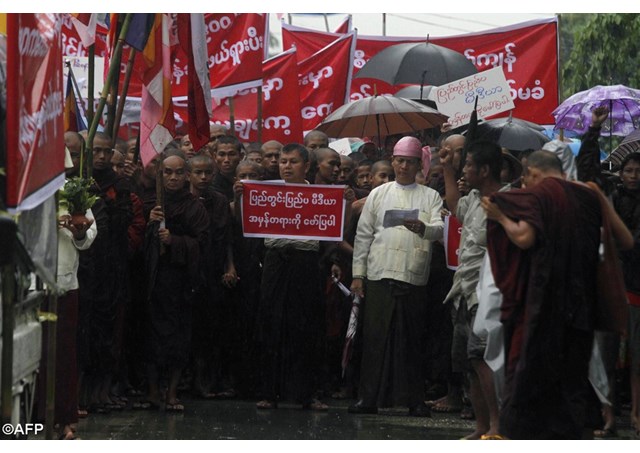
Myanmar Buddhists launch fresh anti-Rohingya protests

(Vatican Radio) Buddhist hardliners backed by monks launched new anti-Rohingya demonstrations in Myanmar's troubled Rakhine state Sunday to protest against help being offered to desperate migrants found adrift on boats in the Bay of Bengal.
Around 500 people, backed by dozens of monks, gathered under heavy rain in the state capital Sittwe. They kept chanting slogans. The protest disbanded voluntarily after two hours. However, no violence was reported.
A protest leader said simultaneous demonstrations took place in 10 townships across the state. "We are protesting against Bengalis that were sent to Rakhine State," said Aung Htay, a protest leader in Sittwe. Most Myanmar nationals, including the government, use the term "Bengali" to describe Rohingya, many of whom have lived in the region for generations.
Tens of thousands of Rohingya have fled Rakhine in recent years, headed for Malaysia and Indonesia. A crackdown on human trafficking in Thailand last month triggered a humanitarian crisis when smugglers abandoned their human cargo on land and at sea.
Some 4,500 Rohingya and Bangladeshi migrants have since washed ashore in the region while the UN estimates around 2,000 others are still trapped at sea. Following international pressure Myanmar’s navy rescued more than 900 migrants who were brought to Rakhine state.
The rescues have angered Buddhist hardliners in Rakhine who regard Muslim Rohingya as illegal Bengali immigrants and want them expelled from Myanmar altogether.
“We protested peacefully to show our disappointment and concern, and deliver a strong message to the government of Myanmar, UN and INGOs that these migrants must be repatriated immediately and that we don’t accept them in the land of Rakhine,” Soe Naing from the Rakhine Social Network and one of the organizers of the Sittwe rally told ucanews.com on Monday.
Most of the country's estimated 1.3 million Rohingya are refused citizenship and face a raft of restrictions on their movement, family size and access to jobs.
A flyer promoting protest plans seen by AFP called on people to "protect the future of Rakhine" and also referred to migrants as "Kalar", a commonly-used racist epithet used to describe Myanmar's Muslims throughout the nation.
Zaw Win, a protest leader in Buthidaung, said around 1,000 people protested there.
“The Rakhine community fear conflict may erupt if these migrants stay longer in Rakhine. That’s why we are protesting,” he told ucanews.com. He said many in the community feared the whole migrant issue was an attempt to settle Bengalis in Rakhine state.
Anti-Muslim sentiment has been on the rise across Myanmar in recent years with radical monks accused of stoking religious tensions with fiery warnings that Buddhism is under threat from Islam.
Neither the government nor opposition parties have shown much appetite to confront communal tensions for fear of alienating Buddhist voters ahead of crunch elections slated for later this year.
Rakhine, one of Myanmar's poorest states, is a tinderbox of tension between its Buddhist majority and a persecuted Rohingya Muslim minority, many of whom live in displacement camps after deadly unrest erupted there in 2012.
Tens of thousands of Rohingya have fled Rakhine in recent years, joined increasingly by economic migrants from neighbouring Bangladesh, mainly headed for Malaysia and Indonesia.
The exodus was largely ignored until a crackdown on the people-smuggling trade in Thailand last month caused chaos as gangmasters abandoned their human cargos on land and sea.
Some 4,500 Rohingya and Bangladeshi migrants have since washed ashore in the region while the UN estimates around 2,000 others are still trapped at sea. After mounting international pressure Myanmar's navy rescued more than 900 migrants who were brought to Rakhine.
Some 150 have since been repatriated to Bangladesh. But the rest are being held in border camps while Bangladesh and Myanmar decide their original nationality.
In Maungdaw, the town closest to the point where Rohingya migrants (at least 900) were recovered and hosted pending a final location, Tin Maung Than, leader of the protest, spoke to the more than 200 people who took to the streets to demonstrate. "Let us gather the people together," he said, to "protest against the Bengali boat people ".
In recent years an anti-Muslim sentiment has spread in Myanmar, fueled by a group of Buddhist monks who foment sectarian tension. In this context, neither the government nor the main opposition party, the National League for Democracy (NLD) led by Aung San Suu Kyi (also the subject of criticism) have intervened to calm tempers and defend the minority.
The UN said that over 416,000 people remain in need of humanitarian aid, including almost 140,000 displaced people living in dire conditions in camps and many others without citizenship in isolated villages after three years of communal violence in Rakhine.
“Access to adequate healthcare and livelihoods remained a major concern of displaced people and vulnerable communities across Rakhine state, while restrictions on the freedom of movement of hundreds of thousands of people had severely compromised their basic rights to food, healthcare, education, livelihoods and other basic services, leaving them dependent on humanitarian aid,” the UN’s Office for the Coordination of Humanitarian Affairs said on June 12.
(AFP, UCAN, Asianews.com)
| All the contents on this site are copyrighted ©. |


